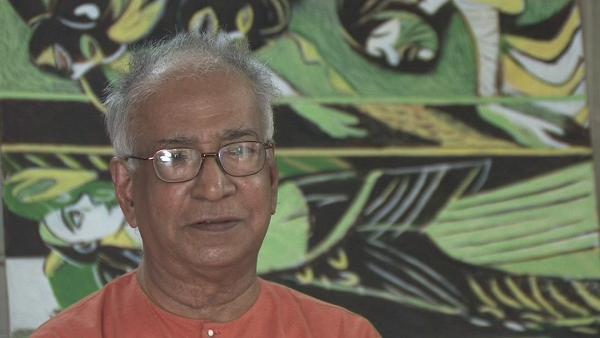NEXT STORY

School in Mahé
RELATED STORIES

NEXT STORY

School in Mahé
RELATED STORIES


|
Views | Duration | |
|---|---|---|---|
| 1. Childhood in Kerala | 1 | 405 | 03:07 |
| 2. Mahé, a ‘comic town’. Silk, schools and... | 136 | 03:51 | |
| 3. School in Mahé | 1 | 79 | 03:07 |
| 4. Mahé’s political underground – ‘I... | 86 | 02:10 | |
| 5. Wood sculptures, temples and study in Mangalore | 118 | 03:11 | |
| 6. Discovering the art of the rest of the world | 87 | 02:43 | |
| 7. From Economics at Presidency College, Madras to the Quit India... | 61 | 03:56 | |
| 8. The Madras Art School, Devi Prasad and a glass of scotch! | 112 | 03:37 | |
| 9. My father’s visit and getting sent to prison | 63 | 05:04 | |
| 10. Release from prison, Gopal Reddy and going to Santiniketan | 68 | 04:26 |

By the time I was 6, my father had retired and we moved to where my eldest brother was. And my eldest brother was about 30 years older than me. So I was the eighth child and he was the first son naturally. And he had got into the educational service of French India at that time, which is how we went to Mahé. Mahé was a very small town, in fact in those days Mahé town itself, I don’t know, it should be the same now. But one square mile of area, it had some areas but not quite adjoining a little further away, which was about 6 square miles. But Mahé itself, the town itself is a very small place. And in those days there weren’t too many people, but it was a great centre for the political underground of British India and it was also a centre for smuggling. Because it was a free port and they generally traded in silks, silver and liquor. So they used to get what they call Fiji silk, like almost a sari length thing, for almost a rupee or two. And while in British India they used to cost a lot, so they used to smuggle a lot of them in. Similarly silver and then foreign liquor. And in that 1 square mile of area, if I remember right, there were about 30 to 40 liquor shops. So people used to come from British India to drink and go back because it was cheaper there. And that small place had... they started sort of an English school. That’s how my brother came there, to teach. He was what they called the first assistant, the next to the headmaster. Then there were other schools. There was a convent and there was a French school that took you up to what they call brevet, that is I think the primary certificate. And there was also another small school that sort of would train people that is I think there were a large number of Moslems there. So they used to sort of make some special arrangements for them, this is as I remember. But it’s a sort of a comic town: it has a police force. Most of the police didn’t know what to do, there was no traffic to be regulated. And it had a municipality and it had a hospital to which very few people went because they were sure that if they get treated, especially in the surgery ward, they would all die of tetanus. So they never... in fact I remember at one time my brother had a problem, a fistula. And he was operated at home by two doctors without anaesthesia. Just because he didn’t want to go to the hospital and then come back dead.
KG Subramanyan (1924-2016) was an Indian artist. A graduate of the renowned art college of Kala Bhavana in Santiniketan, Subramanyan was both a theoretician and an art historian whose writings formed the basis for the study of contemporary Indian art. His own work, which broke down the barrier between artist and artisan, was executed in a wide range of media and drew upon myth and tradition for its inspiration.
Title: Mahé, a ‘comic town’. Silk, schools and smuggling
Listeners: Timothy Hyman
Timothy Hyman is a graduate of Slade School of Fine Art, London, in which he has also taught. In 1980 and 1982, he was Visiting Professor in Baroda, India. Timothy Hyman has curated many significant art exhibitions and has published articles and monographs on both European and Indian artists.
Duration: 3 minutes, 51 seconds
Date story recorded: 2008
Date story went live: 10 September 2010